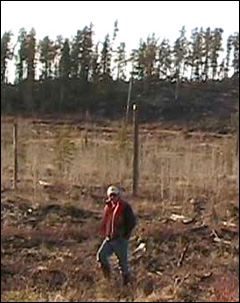see Amnesty's work on Grassy Narrows
J.B. Fobister walks through a clearcut on the Grassy Narrows traditional territory
"Six years ago when we blocked the main logging road near our small community people told us we were crazy to take on two of the largest logging companies in the world. We weren’t crazy, we were just fed up with watching our livelihood, our culture, our medicine, our children’s future – our forests – being carried off our land right before our eyes." – June 5, 2008message from Grassy Narrows spokesperson J.B. Fobister
17 August 2009
The flooding of their lands. The poisoning of their waters. The large-scale, clearcut logging of their traditional hunting and trapping territories.
The people of Grassy Narrows, an Anishnabe First Nation in northwest Ontario, have repeatedly suffered the devastating impact of government decisions made without their consent.
In 2002, community members launched a blockade to stop clearcut logging in their traditional territory. The blockade is one of the longest running Indigenous land protests in Canadian history.
In January, 2007, the people of Grassy Narrows called for a moratorium on logging and other resource development in their traditional territory.
In 2008, the Boise paper company – a major client of AbitibiBowater's Fort Frances mill – announced that it would stop buying pulp from wood logged at Grassy Narrows until the community gave its consent.
Shortly afterward, AbitibiBowater announced that its Fort Frances mill would stop processing wood from Grassy Narrows. The company also said that it wanted to give up the provincial license under which it manages all logging in the Whisky Jack forest.
While this has temporarilyu halted logging at Grassy Narrows, the future is uncertain. The province and the community have entered into talks about the long term management of the forest, but the province has never ruled out renewed logging, with or without the community's consent.
Canadian law requires a process of good faith consultation and meaningful accommodation of Indigenous concerns whenever government decisions might affect the rights of Indigenous peoples. In some instances, Canadian law, like international human rights standards, requires that no action be taken except with the consent of the affected peoples.
Given the harm that has already been done to the people of Grassy Narrows, the precarious stituation in which they now live, Amnesty International has urged the provincial government to apply the highest standard of protection to their rights.
In a September 2007 briefing paper, Amnesty International urged the province of Ontario to respect the moratorium called by the people of Grassy Narrows so that their rights would not be further eroded by continued large-scale resource extraction activities taking place against their wishes.
Amnesty International also called on companies logging at Grassy Narrows or buying wood and wood fiber from the territory to “work toward a voluntary suspension of logging in the Grassy Narrows traditional territory and/or establish alternative sources for wood fibre, taking into consideration the fact that the people of Grassy Narrows have not given their consent to large-scale logging in their traditional territory."
Updated:17 August 2009





